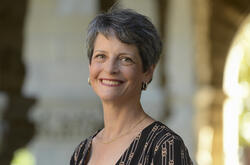The Future of Multilateral Institutions in the Era of Great Power Competition
The Future of Multilateral Institutions in the Era of Great Power Competition
Tuesday, December 5, 202312:00 PM - 1:30 PM (Pacific)
Encina Hall, Third Floor, Central, C330
616 Jane Stanford Way, Stanford, CA 94305

As part of Stanford's Asia Pacific Research Center (APARC) event series focused on APEC 2023, the China Program is pleased to present the concluding session, 'The Future of Multilateral Institutions in the Era of Great Power Competition.' We invite you to join us for this session, where we will delve into how the U.S., China, and other APEC members are adapting and evolving their strategies for engaging within international organizations. We’ll also cast a spotlight on the outcomes of APEC 2023 and their implications for understanding how multilateral institutions are adjusting to the challenges of an era marked by geopolitical rivalry.
This event is part of the series Exploring APEC’s Role in Facilitating Regional Cooperation.

Matthew P. Goodman is distinguished fellow for global economic policy and director of the Greenberg Center for Geoeconomic Studies at the Council on Foreign Relations (CFR). He leads a cross-cutting program on global economics at CFR that works to develop new approaches to trade and other international economic policies. Prior to joining CFR in September 2023, Goodman was senior vice president for economics and Simon chair in political economy at the Center for Strategic and International Studies (CSIS). From 2010 to 2012, he served as director for international economics on the National Security Council staff, helping the U.S. president prepare for global and regional summits, including for the Group of 20, Asia-Pacific Economic Cooperation (APEC), and East Asia Summit. Prior to serving in the White House, he was senior advisor to the undersecretary for economic affairs at the U.S. Department of State. Before joining the Barack Obama administration in 2009, Goodman worked for five years at Albright Stonebridge Group, where he was managing director for Asia. From 2002 to 2004, he served at the White House as director for Asian economic affairs on the National Security Council staff. Prior to that, he spent five years at Goldman Sachs, heading the bank’s government affairs operations in Tokyo and London. From 1988 to 1997, he worked as an international economist at the U.S. Treasury Department, including five years as financial attaché at the U.S. embassy in Tokyo. Goodman holds a BSc in economics from the London School of Economics and an MA in international relations from the Johns Hopkins University’s School of Advanced International Studies.

Michael McFaul is Director at the Freeman Spogli Institute for International Studies, the Ken Olivier and Angela Nomellini Professor of International Studies in the Department of Political Science, and the Peter and Helen Bing Senior Fellow at the Hoover Institution. He joined the Stanford faculty in 1995. Dr. McFaul also is as an International Affairs Analyst for NBC News and a columnist for The Washington Post. He served for five years in the Obama administration, first as Special Assistant to the President and Senior Director for Russian and Eurasian Affairs at the National Security Council at the White House (2009-2012), and then as U.S. Ambassador to the Russian Federation (2012-2014). He has authored several books, most recently the New York Times bestseller From Cold War to Hot Peace: An American Ambassador in Putin’s Russia. Earlier books include Advancing Democracy Abroad: Why We Should, How We Can; Transitions To Democracy: A Comparative Perspective (eds. with Kathryn Stoner); Power and Purpose: American Policy toward Russia after the Cold War (with James Goldgeier); and Russia’s Unfinished Revolution: Political Change from Gorbachev to Putin. His current research interests include American foreign policy, great power relations, and the relationship between democracy and development. Dr. McFaul was born and raised in Montana. He received his B.A. in International Relations and Slavic Languages and his M.A. in Soviet and East European Studies from Stanford University in 1986. As a Rhodes Scholar, he completed his D. Phil. in International Relations at Oxford University in 1991.

Laura Stone, a member of the US Department of State, is the Inaugural China Policy Fellow for the 2022-2023 academic year at the Walter H. Shorenstein Asia-Pacific Research Center (Shorenstein APARC). She was formerly Deputy Assistant Secretary of State for India, Nepal, Sri Lanka, Bangladesh, Bhutan, and Maldives, the Acting Deputy Assistant Secretary for China and Mongolia, the Director of the Office of Chinese and Mongolian Affairs, and the Director of the Economic Policy Office in the Bureau of East Asia and Pacific Affairs. She served in Beijing, Bangkok, Tokyo, the Public Affairs Bureau, the Pentagon Office of the Secretary of Defense, and the Bureau of Intelligence and Research. While at APARC, she is conducting research with the China Program on contemporary China affairs and U.S.-China policy.
